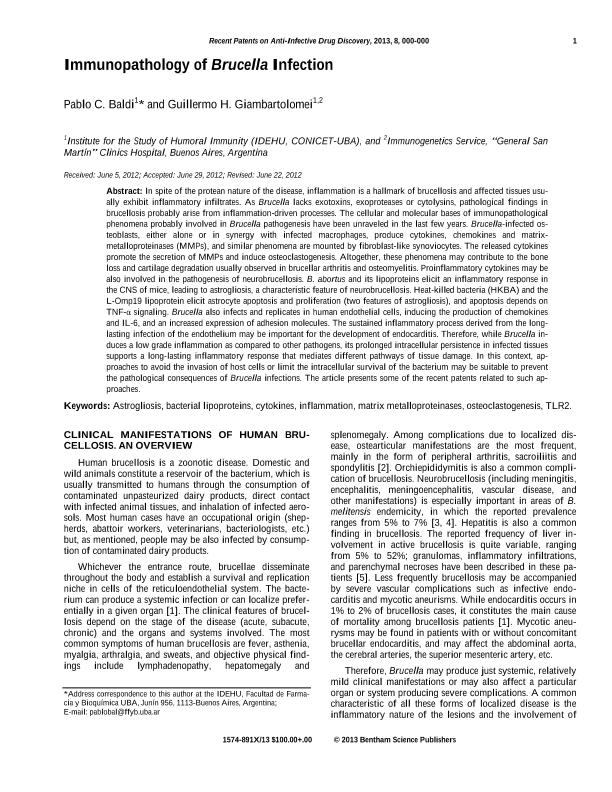Artículo
Immunopathology of Brucella infection
Fecha de publicación:
02/2013
Editorial:
Bentham Science Publishers
Revista:
Recent patents on anti-infective drug discovery
ISSN:
1574-891X
Idioma:
Inglés
Tipo de recurso:
Artículo publicado
Clasificación temática:
Resumen
In spite of the protean nature of the disease, inflammation is a hallmark of brucellosis and affected tissues usually exhibit inflammatory infiltrates. As Brucella lacks exotoxins, exoproteases or cytolysins, pathological findings in brucellosis probably arise from inflammation-driven processes. The cellular and molecular bases of immunopathological phenomena probably involved in Brucella pathogenesis have been unraveled in the last few years. Brucella-infected osteoblasts, either alone or in synergy with infected macrophages, produce cytokines, chemokines and matrixmetalloproteinases (MMPs), and similar phenomena are mounted by fibroblast-like synoviocytes. The released cytokines promote the secretion of MMPs and induce osteoclastogenesis. Altogether, these phenomena may contribute to the bone loss and cartilage degradation usually observed in brucellar arthritis and osteomyelitis. Proinflammatory cytokines may be also involved in the pathogenesis of neurobrucellosis. B. abortus and its lipoproteins elicit an inflammatory response in the CNS of mice, leading to astrogliosis, a characteristic feature of neurobrucellosis. Heat-killed bacteria (HKBA) and the L-Omp19 lipoprotein elicit astrocyte apoptosis and proliferation (two features of astrogliosis), and apoptosis depends on TNF-α signaling. Brucella also infects and replicates in human endothelial cells, inducing the production of chemokines and IL-6, and an increased expression of adhesion molecules. The sustained inflammatory process derived from the longlasting infection of the endothelium may be important for the development of endocarditis. Therefore, while Brucella induces a low grade inflammation as compared to other pathogens, its prolonged intracellular persistence in infected tissues supports a long-lasting inflammatory response that mediates different pathways of tissue damage. In this context, approaches to avoid the invasion of host cells or limit the intracellular survival of the bacterium may be suitable to prevent the pathological consequences of Brucella infections. The article presents some of the recent patents related to such approaches.
Palabras clave:
Brucella
,
Immunopathology
,
Inflammation
Archivos asociados
Licencia
Identificadores
Colecciones
Articulos(IDEHU)
Articulos de INST.DE EST.DE LA INMUNIDAD HUMORAL PROF.R.A.MARGNI
Articulos de INST.DE EST.DE LA INMUNIDAD HUMORAL PROF.R.A.MARGNI
Articulos(INIGEM)
Articulos de INSTITUTO DE INMUNOLOGIA, GENETICA Y METABOLISMO
Articulos de INSTITUTO DE INMUNOLOGIA, GENETICA Y METABOLISMO
Citación
Baldi, Pablo Cesar; Giambartolomei, Guillermo Hernan; Immunopathology of Brucella infection; Bentham Science Publishers; Recent patents on anti-infective drug discovery; 8; 1; 2-2013; 18-26
Compartir
Altmétricas




